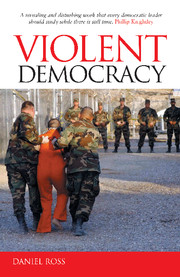Book contents
Introduction
Published online by Cambridge University Press: 22 September 2009
Summary
A new Fascism, with its trail of intolerance, of abuse, and of servitude, can be born outside our country and be imported into it, walking on tiptoe and calling itself by other names, or it can loose itself from within with such violence that it routs all defenses. At that point, wise counsel no longer serves, and one must find the strength to resist. Even in this contingency, the memory of what happened in the heart of Europe, not very long ago, can serve as support and warning.
Primo LeviSince its invention democracy has imagined itself as the solution to the violence of tyranny and chaos. But democracy has from the beginning contained its own potential for violence, for instance the violence of capitalism. This is not only the violence of economic or imperial wars, but also the consequence of opening and penetrating both consumer and labor markets. More generally there is violent power involved in the fluidity of capital, which can enrich or impoverish one state or another with drastic results. Even on its own terms, democracy has reserved the right to resort to violent action and claimed a monopoly on the “legitimate” use of violent means. The legitimacy of this monopoly has always been dependent upon the assertion of just ends. Violent means were always relative to and justified on the grounds of democratic ends, even when democracy perpetrated deadly violence.
- Type
- Chapter
- Information
- Violent Democracy , pp. 1 - 13Publisher: Cambridge University PressPrint publication year: 2004



